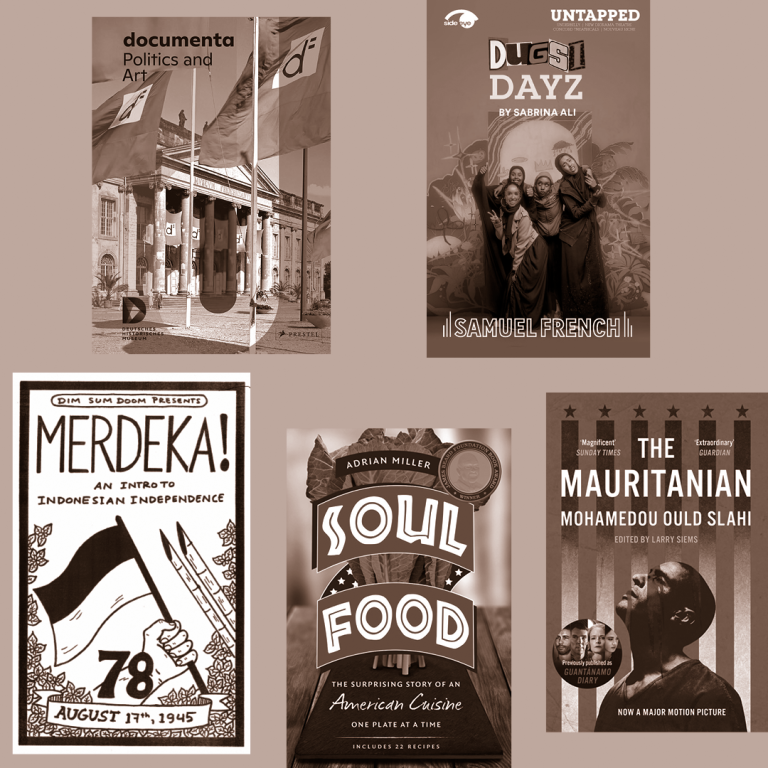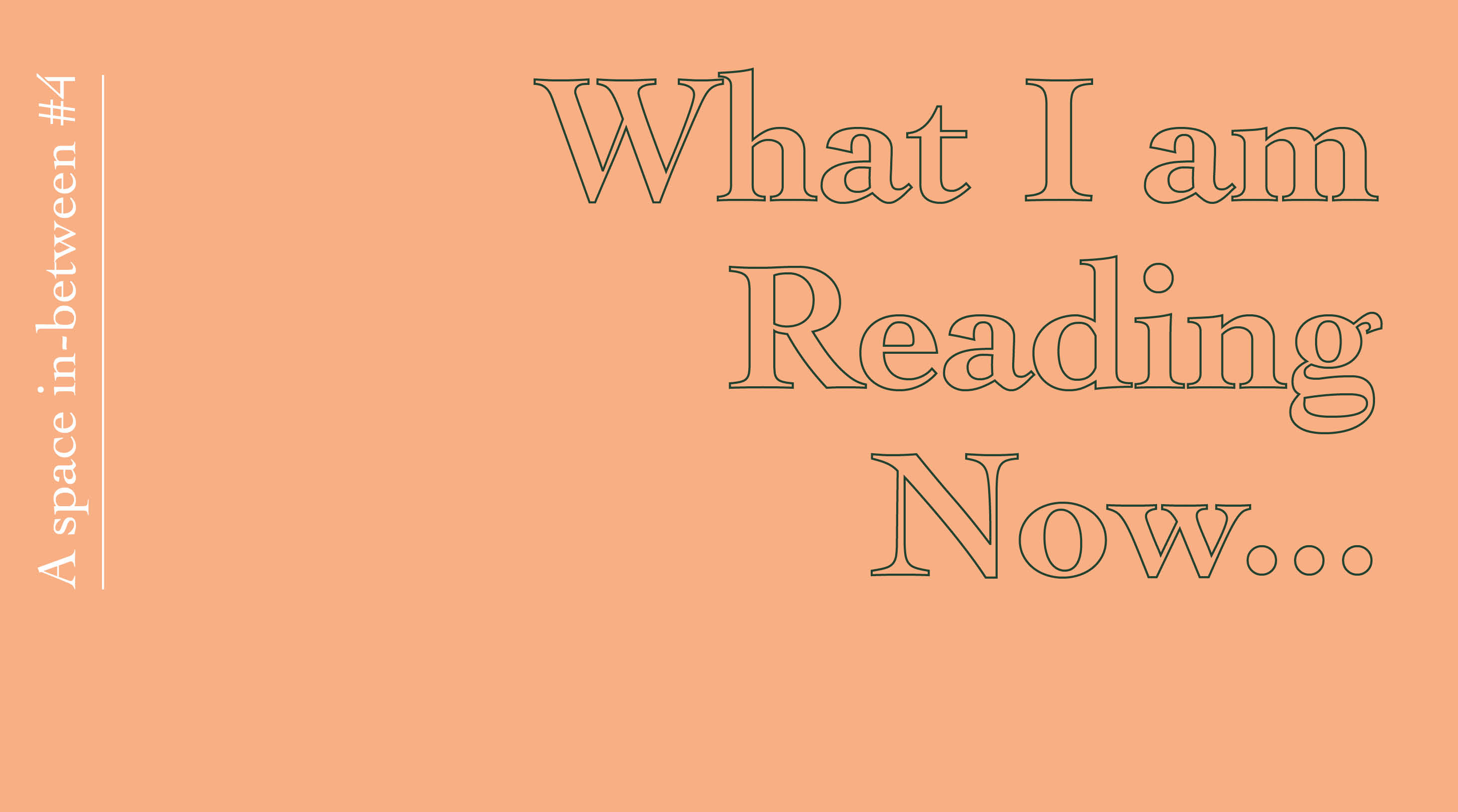What I am Reading Now…
Hamja Ahsan
January 2024
I am still recovering from the trauma of Documenta 15.
Feeling like prey for all 100 days: vandalism of our exhibition spaces, daily Islamophobic online threats to burn my art, deport me and kill me; violent street attacks on my fellow artists from Indian collective Party Office, stalking and exhibition disruptions of black Caribbean artists in Ghetto Biennale; and an entire German media establishment and Liberal arts media silent or complicit in our abuse. One of the sources of consolation was looking at the history of Documenta, Documenta: Politics and Art that anthologises the archives in the context of Post-WW2 and cold war German history.
We weren’t the first. The archives anthologised in this book show there had been a ton of manure dumped outside of one of my exhibition venues, the Fridericianum in 1972 at Documenta 5 by a farmer and far-right group Die Bauernschaft. It was revealing to learn about the dark hidden history of Nazis and War criminals with the early editions of the mega exhibition. Has that nation really learned from history?
I question where Muslim diasporas fit in the arts world, especially after such extreme hostility at our mere existence in Germany. For this reason, Sabrina Ali, the young playwright of Dugsi Dayz was the hero of Edinburgh Fringe Festival (which I attended for the first time this year) with sell out performances and 5 star reviews, sweeping a white-dominated space with a new mosque and hijabi aunty crowd. Through my book Shy Radicals I drew on how the teenage movie could be subverted into a constitution. Sabrina Ali subverts on the format of 1980 film The Breakfast Club. Her characters don’t follow the model minority trap or White Liberal pity bait, but show a group of female students in detention class in Islamic madrassa in all their multiplicities drawing on Somali folk tales and Islamic life worlds. The most sharp, funny, brilliant portrayal of Muslim minority diasporic experience I have seen. The book of the playscript is available and Inshallah may her work live on in a future run of performances.
As an extension of my practice at Documenta based on a series of fictional Halal Fried Chicken chains, I envision creating a future reading group called Critical Chicken. I plan our first text would be Adrian Miller’s Soul Food that narrates the epic history of Fried Chicken through the transatlantic slave trade, Yoruba theology and deep South church. The “Gospel Bird” was used in the Black Christian tradition as a marker that one was unpretentious and humble and with the people. I wonder how it could be used critically in a reading group alongside this staple from my South London home landscape.
One of the positive aspects of Documenta with Ruangrupa, deep connection with postcolonial Indonesia. I still converse with members of the Indonesia collective daily on social media – Ajeng and Ade, Reza, Farid and Ishwanto, swapping notes on Indonesian Ayam Goreng Fried Chicken. Merdeka Zine by Chiquita Dineyanti, a diasporic Indonesian based in California, with her zine project Dim Sum Doom, is a charming introduction of Indonesian anti-colonial history. It also includes images of the folk games. Dineyanti also makes zines on the Java legend of Rice and Tropical terrors of Ghosts and Monsters. Zines make the body of my friendships, alliances and convivial way of surviving. Documenta 15 also had a zine vibe about it and Ruangrupa wanted to rebirth my annual zine festival DIY Cultures. I archive and distro Dineyanti’s zines in the UK zine scene.
Prison literature has always been central to my critical question of power and the state more than the ossified world of “critical theory”. Guantanamo life-writing has been central, especially as someone who campaigns for the former prisoners and the torture centres’ closure. Mohamedou Ould Slahi first publication is an account of his Guantanamo ordeal that was written whilst he was still detained. It was heart-breaking to see my beloved friend bullied out of his role as curator of Berlin’s African book festival from Germany this year. It felt like the same system of racist persecution from the German establishment used to expel another good person.
I left Germany in fear for my life and haven’t returned as the fascist AfD now poll as the 2nd largest party. I pray daily for Germany… and books are part of my healing journey towards social justice.
Hamja Ahsan is an artist, writer and activist based in London. He is the author of Shy Radicals: AntiSystemic Politics of the militant Introvert. He was awarded the Grand Prize for the artwork Aspergistan Referendum at Ljubjana Biennial 2019 based on this book. He is part of the Asylum magazine editorial radical mental health collective. He ran the DIY Cultures zine festival. He is currently working on his 2nd book Radical Chicken about his Documenta 15 project on Halal Fried Chicken shops.
Reading
Documenta: Politics and Art, eds. Raphael Gross et al (Stiftung Deutsches Historische Museum & Prestel, 2021)
Dugsi Dayz, Sabrina Ali (Samuel French, 2023)
Merdeka! An Intro to Indonesia Independence, Chiquita Dineyanti (Dim Sum Doom Zines, 2023)
Soul Food: The Surprising Story of American Cuisine, One Plate at a Time, Adrian Miller (The University of North Carolina, 2016)
The Mauritanian, Mohamedou Ould Slahi, ed, Larry Siems (Canongate Books, 2021)

Please note the views published in What I am Reading Now… are personal reflections of the contributors.
These may not necessarily represent the views of the University of Dundee.
Readers who wish to make a donation to support Medical Aid for Palestinians can do so here.
———
Previous Issue: Maria Chávez, December 2023
Next Issue: Dayna Ash, February 2024
